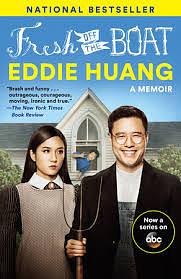Take a photo of a barcode or cover
So great and also so not. I struggle with connecting to parts of this story and not liking other parts. Guess that is the human experience.
funny
informative
inspiring
reflective
medium-paced
Not a bad read if you're looking for fluff and some observations about hip-hop and food. I wished throughout, however, that Huang would turn his razor-sharp critiques against himself for a moment and see that many of the ways he handled being subject to racism were available to him because of his fabulously privileged upbringing. He offers no honest reflections on how his economic status allowed him to actively resist the pressure to fulfill the image of a model minority ("Uncle Chans" in his parlance, an off the mark appropriation of Uncle Tom). Instead, we are meant to understand that his being gifted a brand new Benz for his 16th birthday is one of the worst things that happened to him. His one major brush with the law (staged at the elite and expensive Rollins College) ended in him being sent to Taiwan to stay with family, not prison. Huang tries to cast himself as a hustler, but it just fell flat in my opinion.
I went into this expecting a chef memoir and it was so much more than that. I related a lot to his childhood struggles at home and school, so that was rough at times to read. I took a star off because all of the sports and hip-hop references went completely over my head, and I just skimmed through those parts.
I never mind the boastfulness that comes with an autobiography as that is purely what it is: someone's account of their life. I can ignore that.
I cannot ignore the ebonics, however, and I felt at times they were used much too frequently, almost in a "look how authentically hood I am" which, I'm not sure I buy. That being said, I loved all of his remarks on white patriarchy and how he would challenge other East Asians who seemed self hating or themselves didn't challenge whiteness. It's refreshing to see other PoC groups question anti-blackness and pro-whiteness in their communities. The way he stands up for himself, as a PoC is so so great. He challenges the "model minority" ideal with such acerbic wit. Despite my questioning of his terminology, I loved this memoir and it's great to hear the account of a man who just gets it.
I cannot ignore the ebonics, however, and I felt at times they were used much too frequently, almost in a "look how authentically hood I am" which, I'm not sure I buy. That being said, I loved all of his remarks on white patriarchy and how he would challenge other East Asians who seemed self hating or themselves didn't challenge whiteness. It's refreshing to see other PoC groups question anti-blackness and pro-whiteness in their communities. The way he stands up for himself, as a PoC is so so great. He challenges the "model minority" ideal with such acerbic wit. Despite my questioning of his terminology, I loved this memoir and it's great to hear the account of a man who just gets it.
Writing style initially drove me up a wall, but second half of book is meatier and more in the high/low style I've appreciated in Huang's other writing. And his story made me appreciate that style more--I had thought he was basically a goody-goody lawyer-turned-hip-hop-stylie guy, but it's the other way around. And just a meaty story about American immigration.
As memoirs go, Huang's scores high on authenticity--he injected his own unique personality into every sentence of this book. Not everyone will appreciate that. Huang is a self-described outsider, a contrarian who is not interested in pleasing anyone but himself. This is by turns refreshing and off-putting, which seems to be Huang in a nutshell. Is Huang as brilliant as he thinks he is? As unique as he's convinced he is? Maybe, maybe not. You can't have achieved what he has without a fair amount of hubris, and this is on full display, but you have to, to borrow one of Huang's oft-used expressions, "respect the hustle." Readers, especially white folks, may not find Huang to be all that likeable--either because he doesn't fit into the stereotype we are comfortable with (his explanation) or because he's a bit of an asshole (in reality, most likely a combination of the two), but regardless he absolutely has a voice worth listening to, especially his musings on race in America (though I'll admit to zoning out on his enraptured descriptions of sneakers).
I read this book because I am a fan of the Fresh of the Boat TV show (and Baohaus). The show diverged greatly from Huang's actual life. It basically took the the general premise of his life ans then went its own way.
Huang's life has been interesting and the writing style also makes this book easy to read. I especially enjoyed Eddie talking about his family and childhood early in the book. The second half of the book — minus the single recipe — was less enjoyable for me. Huang comes off smug and I found him off-putting. But overall this was still a good read.
Huang's life has been interesting and the writing style also makes this book easy to read. I especially enjoyed Eddie talking about his family and childhood early in the book. The second half of the book — minus the single recipe — was less enjoyable for me. Huang comes off smug and I found him off-putting. But overall this was still a good read.
I was intrigued at first, but lost interest about 1/3 of the way through.







